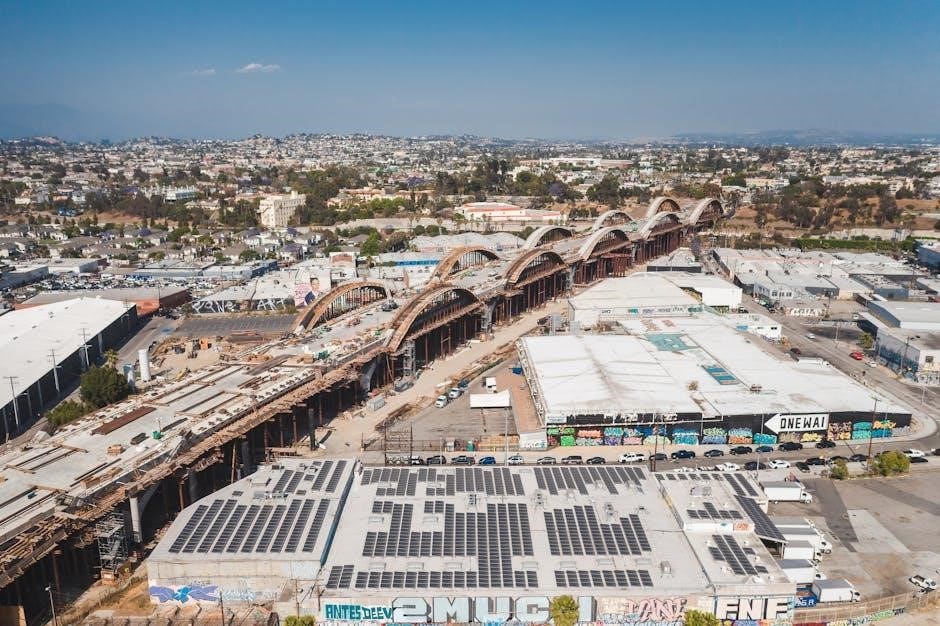The Los Angeles Progressive Voter Guide is a comprehensive resource designed to help voters make informed decisions aligned with progressive values and policies․
1․1 Understanding the Purpose of a Progressive Voter Guide
A progressive voter guide serves as a vital tool for voters seeking to align their choices with progressive values and policies․ Its primary purpose is to provide clear, concise information about candidates, ballot measures, and initiatives, helping voters make informed decisions․ By evaluating candidates’ track records, policy positions, and endorsements, the guide empowers voters to support leaders who champion social justice, environmental sustainability, and economic equity․ Additionally, it highlights key issues impacting communities, such as housing affordability, criminal justice reform, and education, ensuring voters understand the implications of their votes․ This resource is essential for navigating complex elections and advancing progressive change in Los Angeles․
1․2 Key Issues for Progressive Voters in Los Angeles
Progressive voters in Los Angeles focus on several critical issues that shape the city’s future․ Housing affordability and homelessness solutions are paramount, addressing the growing housing crisis and ensuring access to affordable housing․ Criminal justice reform and police accountability are also key, advocating for a fairer justice system and transparent law enforcement․ Environmental sustainability is essential, with efforts to combat climate change and improve air quality․ Education remains a priority, aiming to enhance public schools and ensure equitable opportunities for all students․ Additionally, transportation and infrastructure improvements are sought to reduce traffic congestion and promote eco-friendly alternatives․ Healthcare access and labor rights are vital, supporting workers’ protections and fair wages․ Lastly, immigration reform is crucial, advocating for policies that protect and empower immigrant communities․

The Progressive Movement in Los Angeles
The progressive movement in Los Angeles emphasizes grassroots activism, equitable policies, and community-driven change, fostering a culture of inclusivity and social justice across the city․
2․1 History of Progressive Politics in LA
Los Angeles has a rich history of progressive politics, rooted in labor rights and social justice movements․ The city has long been a hub for grassroots activism, particularly during the mid-20th century, when unions and community organizations fought for workers’ rights, fair housing, and civil rights․ In recent decades, progressive coalitions have focused on issues like affordable housing, criminal justice reform, and environmental sustainability․ The influence of organizations such as the Los Angeles Federation of Labor and local chapters of the ACLU has shaped the city’s political landscape․ Today, LA continues to be a beacon for progressive policies, with a strong emphasis on equity and community-driven change․
2․2 Current Progressive Organizations and Their Roles
Los Angeles is home to numerous progressive organizations that play pivotal roles in shaping policy and advocacy efforts․ Groups like the Los Angeles Federation of Labor and the ACLU of Southern California champion workers’ rights, civil liberties, and social justice․ Environmental organizations such as the Sierra Club and the Los Angeles chapter of the Sunrise Movement focus on climate action and sustainability․ Community-based organizations like the Koreatown Immigrant Workers Alliance (KIWA) and the Los Angeles Tenants Union (LATU) advocate for immigrant rights and housing affordability․ These organizations often collaborate to amplify progressive voices, ensuring equitable policies and grassroots representation in local governance․
Key Issues for Progressive Voters
Progressive voters in Los Angeles prioritize housing affordability, criminal justice reform, environmental sustainability, healthcare access, education funding, and workers’ rights, driving equitable policy change․
3․1 Housing Affordability and Homelessness Solutions
Housing affordability and homelessness are critical issues in Los Angeles, with rising rents and a growing unhoused population․ Progressive solutions focus on rent control, affordable housing construction, and tenant protections․ Voters are urged to support policies that address the root causes of homelessness, such as lack of affordable housing and mental health services․ Ballot measures often include funding for housing initiatives and services for unhoused individuals․ Ensuring equitable housing policies is central to creating a sustainable and inclusive city for all residents․ Voters should prioritize candidates and initiatives that commit to comprehensive housing reform and compassionate solutions to homelessness․
3․2 Criminal Justice Reform and Police Accountability
Criminal justice reform and police accountability are central to progressive priorities in Los Angeles․ Efforts focus on ending mass incarceration, addressing racial disparities, and increasing transparency in law enforcement․ Progressive candidates often support policies like ending cash bail, diverting funds from policing to community services, and implementing civilian-led oversight boards․ Voters are encouraged to back measures that prioritize rehabilitation over punishment and ensure accountability for police misconduct․ These reforms aim to create a fairer justice system and build trust between law enforcement and the communities they serve․ Supporting progressive candidates and initiatives in this area is crucial for advancing equity and justice in Los Angeles․
3․3 Environmental Sustainability and Climate Action
Environmental sustainability and climate action are critical priorities for progressive voters in Los Angeles․ The city faces challenges like air pollution, drought, and extreme heat, requiring bold measures to reduce greenhouse gas emissions and transition to renewable energy․ Progressive candidates and initiatives often emphasize investments in clean energy infrastructure, public transportation, and green spaces․ They advocate for policies that promote zero-waste goals, protect natural resources, and ensure equitable access to environmental benefits․ Addressing climate change also involves creating green jobs and supporting communities disproportionately affected by pollution․ By prioritizing sustainability, Los Angeles can lead in building a resilient, eco-friendly future for all residents․
3․4 Education and Public Schools
Education and public schools are vital to Los Angeles’ progressive agenda, focusing on ensuring equitable access to quality learning for all students․ Progressives advocate for increased funding to reduce class sizes, improve teacher pay, and modernize school facilities․ They emphasize the importance of programs that address systemic inequities, such as bilingual education, special needs support, and access to extracurricular activities․ Additionally, there is a push for policies that prioritize student well-being, including mental health services and nutrition programs․ By addressing these issues, progressives aim to create a more inclusive and supportive educational environment that prepares students for future success and empowers communities․
Ballot Measures and Initiatives
This section explores the significance of ballot measures and initiatives in Los Angeles elections, providing insights into evaluating progressive policies and their impact on local communities․
4․1 Overview of Ballot Measures in Recent Elections
Recent Los Angeles elections have featured ballot measures addressing housing affordability, criminal justice reform, and environmental sustainability․ These initiatives reflect the city’s progressive priorities, aiming to tackle pressing issues like homelessness and climate change․ Voters have shown strong support for measures promoting affordable housing and police accountability, indicating a shift toward equitable policies․ Environmental initiatives, such as those targeting carbon emissions, have also gained traction․ The outcomes of these measures highlight the effectiveness of grassroots campaigns and the importance of voter engagement in shaping the city’s future․ Understanding these trends is crucial for evaluating the impact of progressive policies in Los Angeles․
4․2 How to Evaluate Progressive Ballot Initiatives
Evaluating progressive ballot initiatives requires careful analysis of their alignment with core values like equity, sustainability, and social justice․ Research the initiative’s language, funding sources, and potential impacts on marginalized communities․ Consider endorsements from trusted organizations and evidence supporting the policy’s effectiveness․ Consider long-term consequences, such as economic implications or environmental benefits․ Engage with voter guides and expert analysis to gain insights․ Ensure the initiative addresses systemic issues without unintended harm․ By critically assessing these factors, voters can make informed decisions that align with their progressive values and contribute to a more equitable Los Angeles․

Candidates and Elected Officials
This section focuses on identifying and evaluating candidates who align with progressive values, ensuring transparency, accountability, and a commitment to policies benefiting Los Angeles communities․
5․1 Identifying Progressive Candidates
Identifying progressive candidates in Los Angeles involves evaluating their policy positions, track records, and endorsements from reputable organizations․ Look for candidates who advocate for social equity, environmental sustainability, and criminal justice reform․ Their platforms often emphasize affordable housing, public education, and healthcare access․ Research their voting history, if incumbents, and campaign finance transparency․ Endorsements from groups like the Democratic Socialists of America or the Sierra Club can signal alignment with progressive values․ Engaging with voter guides and attending community forums provides deeper insights into a candidate’s commitment to progressive ideals and their ability to represent the diverse needs of Los Angeles residents effectively․
5․2 Evaluating Candidates’ Track Records and Policies
Evaluating candidates’ track records and policies involves analyzing their past actions, voting history, and proposed initiatives․ Review their stance on key issues like housing affordability, criminal justice reform, and environmental sustainability․ Assess whether their policies align with progressive values, such as equity, inclusivity, and social justice․ Consider their accountability to constituents and transparency in decision-making․ Consider endorsements from trusted organizations and community feedback․ Tools like voter guides and candidate websites provide valuable insights․ Comparing their platforms with others ensures alignment with your values․ This process helps identify leaders committed to advancing progressive change in Los Angeles, ensuring informed decisions at the polls․ Stay informed to make impactful choices․

The Voting Process in Los Angeles
The Los Angeles voting process offers options like in-person, early, and mail-in ballots, ensuring accessibility and convenience for all eligible voters in the county․
6․1 Voter Registration and Eligibility
To participate in Los Angeles elections, residents must register to vote by the deadline, typically 15 days before the election․ Eligibility requires being 18 years old, a U․S․ citizen, and not currently in state or federal prison․ Those on parole or probation can vote, but individuals currently incarcerated cannot․ Voters must update their registration if they move or change their name․ Online registration is available through registertovote․ca․gov․ Mail-in and in-person registration options are also accessible․ Ensuring eligibility and maintaining updated voter registration are crucial steps to exercising the right to vote in Los Angeles elections․
6․2 Early Voting and Mail-In Ballot Options
Los Angeles offers convenient early voting and mail-in ballot options to ensure voter accessibility․ Early voting typically begins 10 days before Election Day at designated locations․ Mail-in ballots are automatically sent to all registered voters, allowing them to vote from home․ Voters can return completed ballots by mail or at drop-off locations․ Requests for mail-in ballots must be made by the deadline, usually 7 days before the election․ These options provide flexibility and convenience, ensuring voters can participate even with busy schedules․ Tracking mail-in ballots online is also available, offering peace of mind․ Early voting and mail-in options are key to increasing voter turnout in Los Angeles․
6․3 Ballot Drop-Off Locations and Voting Centers
Los Angeles provides numerous ballot drop-off locations and voting centers for voter convenience․ These sites are strategically placed across the county, including libraries, community centers, and public buildings․ Voters can deposit completed mail-in ballots at drop-off locations or cast in-person votes at voting centers․ Many locations offer extended hours, including weekends, to accommodate various schedules․ To find the nearest drop-off location or voting center, voters can use the Los Angeles County Registrar-Recorder/County Clerk’s online tool․ These accessible options ensure voters can securely submit their ballots or vote in person, promoting participation and ease in the electoral process․
Voter Resources and Tools
Los Angeles offers various voter resources, including online tools, voter guides, and interactive maps, to help voters track ballots, find polling places, and access candidate information efficiently․
7․1 Voter Guides and Endorsements
Voter guides and endorsements are essential tools for Los Angeles progressives, providing detailed evaluations of candidates and ballot measures․ These resources help voters align their choices with progressive values and policies․ Endorsements from organizations like the LA Democratic Party, labor unions, and environmental groups offer credibility and insight․ Voter guides often break down complex issues, making it easier for residents to make informed decisions․ By leveraging these tools, voters can ensure their selections support equity, sustainability, and social justice․ Accessing these guides through trusted websites or community networks is crucial for maximizing their impact and ensuring progressive priorities remain central to local elections․
7․2 Online Tools for Tracking Votes and Results
Online tools empower Los Angeles voters to track votes and election results in real-time, enhancing transparency and engagement․ Platforms like the Los Angeles County Registrar-Recorder/County Clerk’s website offer ballot tracking and election result updates․ Voting Solutions for All People (VSAP) provides accessible tools for voters to monitor their ballots and ensuring their votes are counted․ Additionally, the Ballot Drop Stop tour allows voters to drop off ballots and receive election information․ These resources ensure voters stay informed and engaged throughout the electoral process, fostering trust and accountability in local elections․

The Role of Endorsements
Endorsements play a key role in guiding voter decisions by highlighting candidates and initiatives aligned with progressive values, helping establish credibility and trust among voters․
8․1 Understanding the Importance of Endorsements
Endorsements are crucial as they provide voters with insights into candidates’ alignment with progressive values and policies․ They are issued by trusted organizations and individuals, offering credibility and guidance․ By backing specific candidates or ballot measures, endorsements help voters navigate complex elections, ensuring their choices reflect their values․ In Los Angeles, progressive organizations carefully vet candidates, making endorsements that highlight commitment to issues like housing affordability and criminal justice reform․ These endorsements act as a seal of approval, empowering voters to make informed decisions that align with their vision for a more equitable and just community․
8․2 Key Progressive Organizations’ Endorsements
Several prominent progressive organizations in Los Angeles play a significant role in shaping elections through their endorsements․ Groups like the Los Angeles Democratic Socialists of America, the LA chapter of the Sierra Club, and the ACLU of Southern California meticulously evaluate candidates and ballot measures․ Their endorsements highlight individuals and initiatives that prioritize issues such as environmental sustainability, housing affordability, and criminal justice reform․ These organizations’ endorsements are highly influential, offering voters a trusted guide to align their votes with progressive values․ By focusing on grassroots concerns, their endorsements ensure that the voices of the community are represented in local and state governance․
Ranked-Choice Voting (RCV) in Los Angeles
Ranked-Choice Voting (RCV) allows voters to rank candidates by preference, ensuring a majority winner without runoffs․ It promotes consensus and reduces negative campaigning in elections․
9․1 How RCV Works and Its Impact on Elections
Ranked-Choice Voting (RCV) allows voters to rank candidates in order of preference․ If no candidate receives a majority, the last-place candidate is eliminated, and their votes are redistributed․ This process repeats until a candidate achieves a majority․ RCV promotes consensus, reduces negative campaigning, and ensures winners reflect broader support․ It eliminates the need for costly runoff elections and empowers voters to express true preferences without fear of “splitting the vote․” This system fosters a more inclusive and representative electoral process, encouraging candidates to appeal to a wider range of voters․ RCV has gained popularity nationwide for its ability to enhance voter satisfaction and election integrity․
The Los Angeles Progressive Voter Guide empowers voters to make informed decisions, driving collective progress and accountability, ensuring a more equitable future for all Angelenos․
10․1 Encouraging Voter Participation
Encouraging voter participation is crucial for fostering a vibrant democracy in Los Angeles․ By educating voters about key issues and candidates, the Progressive Voter Guide helps residents make informed decisions․ Grassroots campaigns and community outreach programs play a vital role in engaging underrepresented groups․ Ensuring access to voter registration resources and early voting options also boosts participation․ Public awareness initiatives, such as workshops and social media campaigns, further empower citizens to exercise their right to vote․ When more people participate, the collective voice of the community strengthens, leading to policies that reflect the needs and aspirations of all Angelenos․
10․2 Staying Informed Beyond Election Day
Staying informed beyond Election Day is essential for ensuring progressive values are upheld in Los Angeles․ Voters should track the actions of elected officials and monitor policy implementations․ Engaging with local organizations and attending community meetings helps maintain accountability․ Subscribing to newsletters and following reliable news sources provides updates on key issues․ Additionally, participating in advocacy campaigns and public comment periods allows citizens to influence ongoing decisions․ By remaining active and informed, individuals can support long-term progressive change and ensure their voices are heard beyond the ballot box․
Post-Election Actions
Post-election actions involve advocating for progressive policies and holding elected officials accountable to ensure alignment with voter priorities and values in Los Angeles․
11․1 Advocating for Progressive Policies
Advocating for progressive policies involves engaging with elected officials, community organizations, and stakeholders to push for legislation that aligns with Los Angeles’ values․ Grassroots organizing, public testimony, and policy briefs are effective tools to influence decision-makers․ Progressive policies often focus on affordable housing, criminal justice reform, and environmental sustainability․ By staying informed and active, voters can ensure their voices are heard beyond election day․ This sustained advocacy builds a stronger, equitable Los Angeles, ensuring that elected officials remain accountable to the people they serve and the policies they promised to uphold․
11․2 Holding Elected Officials Accountable
Holding elected officials accountable requires active engagement from voters and communities․ This involves monitoring their policy decisions, tracking their voting records, and ensuring they align with campaign promises․ Attend city council and community meetings to voice concerns and demand transparency․ Utilize online tools to review legislative actions and budget allocations․ Grassroots movements and advocacy groups play a crucial role in keeping officials accountable by organizing protests, petitions, and public awareness campaigns․ Accountability ensures that elected representatives remain committed to serving the public interest and addressing the needs of Los Angeles’ diverse communities effectively․



